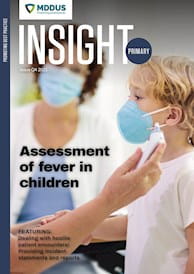BACKGROUND
Ms T attends an out-of-hours clinic with her 13-month-old baby, Joan, having been referred by NHS 24. Joan has a fever and has been vomiting. She is seen in the clinic by a locum GP – Dr Y.
Ms T reports that Joan had diarrhoea and vomiting that evening but had managed to eat and drink earlier in the day. Dr Y examines Joan and records: Temp: 38.7. Pulse: 180. Resp rate: 24. SP02: 96%. Cap refill: less than 2 seconds. No rash. He further notes that Joan is bright and alert, and her chest is clear and abdomen soft and non-tender.
Dr Y diagnoses viral illness and administers paracetamol along with fluids. Ms T is advised to wait at the clinic and Joan is later reviewed. Dr Y records: Temp: 38.1. Pulse 125.
Joan is discharged with a prescription for paracetamol/ibuprofen. Ms T is advised to monitor the baby’s condition, ensuring she takes plenty of fluids and is kept cool. She is further advised to return to the clinic or her own GP if Joan does not settle or her condition worsens.
Ms T puts Joan to bed on arriving home, and awaking at 8am the next morning she discovers the baby has died. A post mortem later confirms that Joan died of meningococcal meningitis.
A letter of claim is sent to Dr Y alleging clinical negligence in his failure to diagnose and refer Joan for suspected meningitis. It states that the baby was exhibiting a considerable number of symptoms associated with meningococcal meningitis and was discharged with a “dangerously high” heart rate. The letter further states that had the infection been diagnosed and further treatment options offered, Joan would not have died.
ANALYSIS/OUTCOME
MDDUS, acting for Dr Y, commissions a primary care expert to review the case and provide an opinion. She observes that the consultation notes from the night Joan attended the OOH are detailed and lengthy. The only positive symptoms were of vomiting earlier in the evening and a fever. Examination revealed a moderate temperature of 38.7, which reduced to 38.1 after medication. Joan also presented with a tachycardia of 180, which reduced to 160 after quietening and 125 after her temperature had come down.
The expert opines that a provisional diagnosis of viral gastroenteritis was reasonable. She further observes that Joan was administered paracetamol, and further supplies were provided to Ms T on discharge. Safety netting including advice on fluids was provided, along with advice on when and how to seek further medical assistance if the situation worsens.
The expert contends that the claim Joan was exhibiting a considerable number of symptoms associated with meningococcal meningitis is unsupported. Specific symptoms would include a non-blanching rash in an ill-looking child, purpura, capillary refill time >3 secs and neck stiffness. None of these symptoms are recorded in the notes.
The notes also reveal that Ms T was instructed to administer further medication during the night. Sadly Ms T failed to wake and check on the baby until eight that next morning. The expert observes that had Ms T done so she might have noticed the deterioration in Joan’s condition.
A letter of response is sent by MDDUS on behalf of Dr Y denying liability and the case is subsequently dropped.
KEY POINTS
- Fever and sickness in young children can present significant challenge to clinicians in distinguishing severe illness.
- Ensure that you follow recognised guidance in the assessment of fever in children (e.g. NICE guideline NG143).
- Provide specific safety netting advice to parents.
- Record findings and indicate clinical justification for management decisions.
This page was correct at the time of publication. Any guidance is intended as general guidance for members only. If you are a member and need specific advice relating to your own circumstances, please contact one of our advisers.
Read more from this issue of Insight Primary

Save this article
Save this article to a list of favourite articles which members can access in their account.
Save to library


